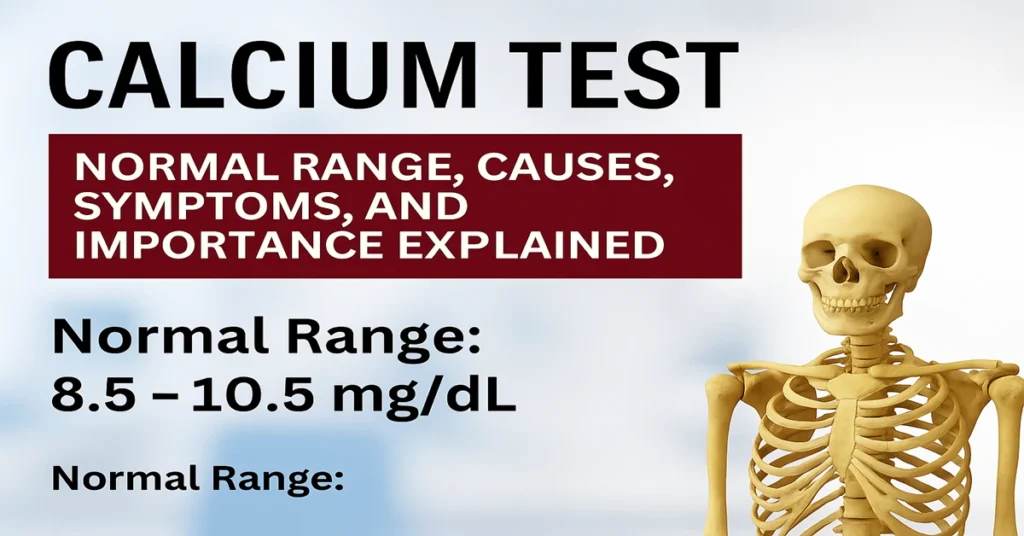What is Calcium?
The Calcium Test measures the amount of calcium in your blood.
Calcium is a vital mineral essential for strong bones and teeth, muscle contraction, nerve function, and blood clotting.
It plays a key role in many body processes, and abnormal calcium levels can signal issues with your parathyroid glands, bones, or kidneys.
There are two types of calcium tests:
- Total Calcium: Measures both bound (attached to proteins) and free calcium in the blood.
- Ionized Calcium: Measures only the active, free form of calcium that is available for use by the body.
This test helps doctors assess bone disorders, calcium metabolism, parathyroid function, and overall kidney health.
Where is Calcium Synthesized/Stored in the Body?
- Calcium is not synthesized by the body — it must come from your diet, such as dairy products, leafy green vegetables, nuts, and fortified foods.
- Around 99% of the body’s calcium is stored in the bones and teeth, providing structure and strength.
- The remaining 1% circulates in the blood and soft tissues, where it supports muscle and nerve activity.
- Calcium levels in the blood are carefully regulated by:
- The parathyroid glands (which control calcium release and absorption),
- Vitamin D (which helps absorb calcium from food), and
- The kidneys (which remove excess calcium).
Main Functions and Importance of Calcium
Calcium is one of the most important minerals in the human body.
Its key functions include:
- Building and maintaining strong bones and teeth
- Supporting muscle contractions, including the heart muscle
- Helping transmit nerve signals
- Enabling proper blood clotting
- Assisting in hormone and enzyme release
Without enough calcium, the body begins to draw it from the bones, leading to weakened bones and possible disorders like osteoporosis.
Causes of Low Calcium Levels (Hypocalcemia)
Hypocalcemia occurs when blood calcium levels fall below the normal range (below 8.5 mg/dL).
Common causes include:
- Vitamin D deficiency (reduces calcium absorption)
- Hypoparathyroidism (low parathyroid hormone)
- Chronic kidney disease
- Magnesium deficiency
- Pancreatitis
- Malabsorption syndromes (e.g., celiac disease)
- Certain medications (bisphosphonates, anticonvulsants)
- Sepsis or severe systemic illness
Symptoms of Low Calcium Levels
Low calcium levels can affect muscles, nerves, and the brain. Symptoms may include:
- Muscle cramps or spasms
- Numbness or tingling in fingers, toes, or lips
- Twitching or tremors
- Fatigue or weakness
- Irritability or anxiety
- In severe cases: seizures or irregular heartbeat (arrhythmia)
Causes of High Calcium Levels (Hypercalcemia)
Hypercalcemia occurs when blood calcium levels are above the normal range (above 10.5 mg/dL).
Common causes include:
- Hyperparathyroidism (overactive parathyroid gland)
- Cancer (especially bone, lung, or breast cancer)
- Excess vitamin D intake
- Prolonged immobilization (loss of bone calcium)
- Thyrotoxicosis (overactive thyroid gland)
- Certain medications (like thiazide diuretics)
- Sarcoidosis or other granulomatous diseases
Symptoms of High Calcium Levels
When calcium levels are too high, it can affect multiple organs, including the brain, kidneys, and heart.
Symptoms may include:
- Nausea or vomiting
- Constipation
- Excessive thirst or frequent urination
- Confusion or drowsiness
- Bone pain or muscle weakness
- In severe cases: kidney stones, abnormal heart rhythm, or even coma
Reference (Normal) Range
| Parameter | Normal Range |
|---|---|
| Serum Calcium | 8.5 – 10.5 mg/dL |
Note: Normal ranges can slightly vary between laboratories depending on the testing method.
Sample Type
Sample Type: Serum (Blood sample)
Tube Used: Red Top (Plain Tube)
Test Preparation
- No special fasting is required for a calcium test.
- Avoid calcium or vitamin D supplements before the test (unless advised by your doctor).
- Stay hydrated and avoid heavy exercise before blood collection.
- Inform your healthcare provider about any medications you’re taking, especially diuretics or antacids.
When to Consult a Doctor
You should consult a doctor if you experience:
- Muscle cramps, numbness, or tingling sensations
- Unexplained fatigue or weakness
- Frequent urination or excessive thirst
- Bone pain or persistent constipation
- Abnormal blood calcium results in routine tests
A doctor may recommend additional tests, such as parathyroid hormone (PTH), Vitamin D, or Kidney Function Tests (KFT) to identify the underlying cause.
Important Word Explanations
| Term | Meaning |
|---|---|
| Hypocalcemia | Low calcium levels in blood |
| Hypercalcemia | High calcium levels in blood |
| Parathyroid Glands | Small glands behind the thyroid that regulate calcium |
| Osteoporosis | Weakening of bones due to calcium loss |
| Ionized Calcium | The active, free calcium circulating in the blood |
| Serum | The clear part of the blood used for testing |
~END~

